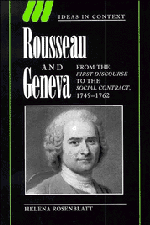Book contents
- Frontmatter
- Contents
- Acknowledgments
- Note on translation
- List of abbreviations
- Introduction. Rousseau in a Genevan context
- 1 The formation of a “citizen of Geneva”
- 2 Rousseau becomes Rousseau, 1751–1754. Geneva, doux commerce, and Rousseau from the First to the Second Discourse
- 3 Rousseau and natural law: the context
- 4 Rousseau and natural law: the Second Discourse
- 5 The “invisible chain”: Rousseau and Geneva from the Second Discourse to the Social Contract
- 6 The Social Contract
- Epilogue
- Select bibliography
- Index
- IDEAS IN CONTEXT
4 - Rousseau and natural law: the Second Discourse
Published online by Cambridge University Press: 28 October 2009
- Frontmatter
- Contents
- Acknowledgments
- Note on translation
- List of abbreviations
- Introduction. Rousseau in a Genevan context
- 1 The formation of a “citizen of Geneva”
- 2 Rousseau becomes Rousseau, 1751–1754. Geneva, doux commerce, and Rousseau from the First to the Second Discourse
- 3 Rousseau and natural law: the context
- 4 Rousseau and natural law: the Second Discourse
- 5 The “invisible chain”: Rousseau and Geneva from the Second Discourse to the Social Contract
- 6 The Social Contract
- Epilogue
- Select bibliography
- Index
- IDEAS IN CONTEXT
Summary
POLITICS IN THE DEDICATION
With a fuller knowledge of the Genevan political context it is now possible to add to our previous discussion of the Dedication. Earlier it was shown that the Dedication upheld the classical republican values of patriotism and political participation against an emerging commercial ethos associated primarily with the Genevan patriciate. Through ostensible flattery Rousseau delivered an ingenious criticism of the values of Geneva's governing body. But as we shall see, the Dedication also contained an outline of Rousseau's theory of the ideal democratic state. This ideal was what he and other members of the Genevan bourgeoisie believed Geneva could and should be. Rousseau defended the Règlement of 1738 which was felt to be in grave danger in Geneva at the time.
Any Genevan would surely have recognized the provocative language and political slant of the Dedication. To begin with, Rousseau dedicated the essay to the General Council, not to the magistrates, which would have been normal procedure. He explained that in doing this, he simply wished to offer Genevan citizens a “public homage.” It is evident, however, that this homage was full of political implications. According to Rousseau, Genevan citizens were a “free people,” not to be confused with the mere “populace of other states.” An “equitable and generous people” they were “long accustomed to prudent independence”; they were “not only free but worthy of being so.”
- Type
- Chapter
- Information
- Rousseau and GenevaFrom the First Discourse to The Social Contract, 1749–1762, pp. 159 - 177Publisher: Cambridge University PressPrint publication year: 1997



